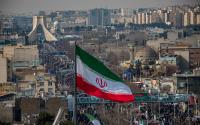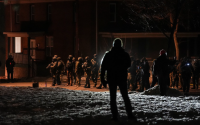23 November 2004Michael Kilian and Naftali BendavidMaconTelegraph.com / Chicago Tribune
The Arctic Council, a group of eight countries with Arctic territory, including the United States, is expected to issue recommendations on global warming Wednesday that will put the spotlight on a critical area where the United States is at odds with many of its allies.
The council's meeting this week in Reykjavik, Iceland, follows a stark report by the council on the consequences of greenhouse gas emissions on the Arctic, which is more vulnerable to global warming than other parts of the world. The Arctic Council's recommendations also come as some Republicans and Democrats in Congress are stepping up calls on the administration to take firmer action on global warming.
The council's 140-page report, four years in the making, warns of massive ice melts, a dramatic rise in ocean levels, the depletion of the Gulf Stream and other sea currents, wild fluctuations in weather patterns, increased ultraviolet radiation and wrenching dislocations in the food chain and habitat.
Sen. John McCain, R-Ariz., who chairs the Senate Commerce Committee and is a strong proponent of action on climate change, called the administration's performance on the issue "disgraceful" at a recent hearing. The administration "could do a much (better) job in telling the American people exactly the challenge we face here," he said.
It is not clear how far the Arctic Council will go in its proposals Wednesday, and the debate has been behind closed doors. But the group operates by consensus, and no recommendation strongly opposed by the United States or another member is likely to survive.
The United States has generally been isolated from its allies in its reluctance to impose significant limits on greenhouse gas emissions. But some environmentalists hope a flurry of activity on global warming will prod the Bush administration to move on the issue.
"This clearly increases the pressure," said Katherine Silverthorn, director of the climate change program at the World Wildlife Fund. "Finally you have people saying, `Climate change is happening here and now. It's affecting American communities in the Arctic.' And you have McCain and others saying we need to do more."
In addition, British Prime Minister Tony Blair will head the G-8 group of industrialized nations next year. He is expected to make global warming a priority and to personally appeal to President Bush on the issue.
Others say that by focusing on research and technology rather than emission limits, Bush is handling the issue just about right, and that his position is unlikely to change much.
"His instincts seem to be good," said Myron Ebell, director of global warming policy at the Competitive Enterprise Institute, a conservative Washington think tank.
Climate change has been a thorny issue for Bush since shortly after he took office in 2001, when he withdrew the United States from the international Kyoto Protocol on global warming. Bush, who said the treaty placed an unfair burden on American industry and that the subject needed more study, called for a voluntary rather than mandatory program of greenhouse emission controls.
The Arctic Council report is providing a catalyst for McCain and others to speak out more forcefully. McCain said the report "clearly demonstrates how the Arctic region is acting as the canary in the coal mine." He added, "We need to ... convince ... this administration to try to stop the continuing increase of greenhouse gases."
But Congress, wary of imposing unfair burdens on U.S. business to address a problem whose extent is uncertain, has not done much either. McCain has joined with Sen. Joseph Lieberman, D-Conn., in sponsoring bipartisan legislation calling for cuts in greenhouse emissions, but with little result.
"We've been trying to get the Congress interested in the scope of this (environmental) change," said Sen. Ted Stevens (R-Alaska), whose state extends into the Arctic region. "But so far, it's not been possible."
The Arctic Council's report, prepared by more than 300 scientists, suggests that the scope of the problem is vast, noting that the Arctic is warming at nearly twice the rate of the rest of the world. That's in part because the ozone layer is thinner there, so any impact from global warming is accelerated.
"The Arctic is warming more rapidly than the rest of the planet, period," Robert Corell, the report's chief author, told Congress. "It's just a fact of the physics of the way the planet functions."
The report adds that if greenhouse gas output is substantially reduced soon, the dangerous changes will take place over a much longer period of time, making the problem more manageable.
But Ebell, of the Competitive Enterprise Institute, portrayed the Arctic Counsel's dire warnings as overblown. "They get the scary predictions for the next century by using one of the more extreme" scenarios, Ebell said. He added that the conclusions are "nutty. They are scaring people by using something that is highly dubious."
Environmentalists disagreed, saying the report was unassailable. "The Arctic Council report, more clearly than any previous report of its kind, shows that global warming is happening now and having significant impact," said Dan Lashof, science director of the Natural Resources Defense Council's climate center.
What is not clear is how the United States will respond. All seven other Arctic Council nations - Russia, Canada, Denmark, Iceland, Norway, Sweden and Finland - are signatories to the Kyoto protocol, and Russia's recent ratification of the treaty gave the pact enough signatories for enactment.
The United States did join 13 other countries this month in agreeing to work together to capture emissions of methane, which contributes to global warming, and to use it as a fuel.
The administration's global warming policy is in many ways a mix. The White House seems reluctant to take on the energy industry, which strongly opposes emissions limits. But it is also is unwilling to dismiss climate change concerns as junk science, as some conservatives do.
That balancing act has drawn criticism from both sides. But while one conservative called it "incoherent," the stronger attacks have come from environmentalists.
"It's basically the worst leadership possible," said Brendan Bell, who works on global warming issues for the Sierra Club. "It says, `Yes, there's a problem, and no, we're not going to do anything about it.'"
The administration disputes that characterization, saying a cautious approach is best. "Our actions should be measured as we learn more from science and build on it," Bush said in a recent statement. "Our approach must be flexible to adjust to new information and take advantage of new technology."
---
© 2004, Chicago Tribune.
Visit the Chicago Tribune on the Internet at http://www.chicagotribune.com
Distributed by Knight Ridder/Tribune Information Services.






